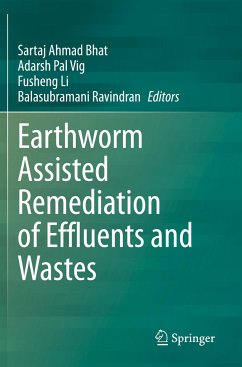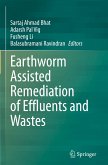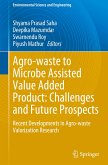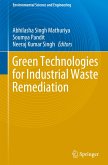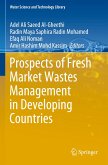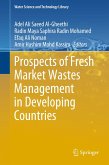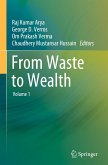Earthworm Assisted Remediation of Effluents and Wastes
Herausgegeben:Bhat, Sartaj Ahmad; Vig, Adarsh Pal; Li, Fusheng; Ravindran, Balasubramani
Earthworm Assisted Remediation of Effluents and Wastes
Herausgegeben:Bhat, Sartaj Ahmad; Vig, Adarsh Pal; Li, Fusheng; Ravindran, Balasubramani
- Broschiertes Buch
- Merkliste
- Auf die Merkliste
- Bewerten Bewerten
- Teilen
- Produkt teilen
- Produkterinnerung
- Produkterinnerung
This book provides updated and comprehensive information on the effective functioning of earthworms used alone or in combination with other biological systems/microbes, as well as factors affecting the process and performance of vermiremediation under a range of conditions. It also compares earthworm assisted vermifiltration with other conventional biochemical methods. Presenting cutting-edge research on the earthworm assisted remediation of industrial and municipal effluents and sludges, along with its role in solid waste management (SWM), the book will benefit readers from the research…mehr
Andere Kunden interessierten sich auch für
![Earthworm Assisted Remediation of Effluents and Wastes Earthworm Assisted Remediation of Effluents and Wastes]() Earthworm Assisted Remediation of Effluents and Wastes116,99 €
Earthworm Assisted Remediation of Effluents and Wastes116,99 €![Agro-waste to Microbe Assisted Value Added Product: Challenges and Future Prospects Agro-waste to Microbe Assisted Value Added Product: Challenges and Future Prospects]() Agro-waste to Microbe Assisted Value Added Product: Challenges and Future Prospects116,99 €
Agro-waste to Microbe Assisted Value Added Product: Challenges and Future Prospects116,99 €![Green Technologies for Industrial Waste Remediation Green Technologies for Industrial Waste Remediation]() Green Technologies for Industrial Waste Remediation108,99 €
Green Technologies for Industrial Waste Remediation108,99 €![Green Technologies for Industrial Waste Remediation Green Technologies for Industrial Waste Remediation]() Green Technologies for Industrial Waste Remediation108,99 €
Green Technologies for Industrial Waste Remediation108,99 €![Prospects of Fresh Market Wastes Management in Developing Countries Prospects of Fresh Market Wastes Management in Developing Countries]() Prospects of Fresh Market Wastes Management in Developing Countries77,99 €
Prospects of Fresh Market Wastes Management in Developing Countries77,99 €![Prospects of Fresh Market Wastes Management in Developing Countries Prospects of Fresh Market Wastes Management in Developing Countries]() Prospects of Fresh Market Wastes Management in Developing Countries77,99 €
Prospects of Fresh Market Wastes Management in Developing Countries77,99 €![From Waste to Wealth From Waste to Wealth]() From Waste to Wealth157,99 €
From Waste to Wealth157,99 €-
-
-
This book provides updated and comprehensive information on the effective functioning of earthworms used alone or in combination with other biological systems/microbes, as well as factors affecting the process and performance of vermiremediation under a range of conditions. It also compares earthworm assisted vermifiltration with other conventional biochemical methods.
Presenting cutting-edge research on the earthworm assisted remediation of industrial and municipal effluents and sludges, along with its role in solid waste management (SWM), the book will benefit readers from the research community and industrial sector alike, familiarizing them with the latest remediation techniques for wastewater and different types of solid waste.
Presenting cutting-edge research on the earthworm assisted remediation of industrial and municipal effluents and sludges, along with its role in solid waste management (SWM), the book will benefit readers from the research community and industrial sector alike, familiarizing them with the latest remediation techniques for wastewater and different types of solid waste.
Produktdetails
- Produktdetails
- Verlag: Springer / Springer Nature Singapore / Springer, Berlin
- Artikelnr. des Verlages: 978-981-15-4524-5
- 1st edition 2020
- Seitenzahl: 376
- Erscheinungstermin: 2. Juli 2021
- Englisch
- Abmessung: 235mm x 155mm x 21mm
- Gewicht: 569g
- ISBN-13: 9789811545245
- ISBN-10: 9811545243
- Artikelnr.: 62131657
- Herstellerkennzeichnung Die Herstellerinformationen sind derzeit nicht verfügbar.
- Verlag: Springer / Springer Nature Singapore / Springer, Berlin
- Artikelnr. des Verlages: 978-981-15-4524-5
- 1st edition 2020
- Seitenzahl: 376
- Erscheinungstermin: 2. Juli 2021
- Englisch
- Abmessung: 235mm x 155mm x 21mm
- Gewicht: 569g
- ISBN-13: 9789811545245
- ISBN-10: 9811545243
- Artikelnr.: 62131657
- Herstellerkennzeichnung Die Herstellerinformationen sind derzeit nicht verfügbar.
Sartaj Ahmad Bhat is working as Post-doctoral Researcher in the River Basin Research Center, Gifu University, Japan. He received his Ph.D. for Environmental Sciences from Guru Nanak Dev University, India in 2017. He is efficient in waste management techniques, especially towards the vermicomposting and substrate compatibility, nutrient enrichment and heavy metal accumulation dynamics. So far, Dr. Bhat has authored more than 30 research publications in peer-reviewed international journals. He is also an editor, editorial board member and reviewer of many international reputed journals published by PLOS, De Gruyter, Springer, SAGE, MDPI, Elsevier and Taylor and Francis. He has been recently awarded as a Top Peer Reviewer 2019 in Environment and Ecology by Publons Web of Science Group and has more than 200 verified reviews to his credit. Adarsh Pal Vig is a Professor and former Head, Department of Botanical and Environmental Sciences, Guru Nanak Dev University, Amritsar,India. Dr.Vig is having teaching and research experience of more than 26 years, about 105 publications in National/International journals with a h-index of 21 and had supervised 10 Ph.D. students. His research mainly focuses on biological treatment technologies for agricultural and industrial wastes. He has been awarded Distinguished Teachers Award, 2012 and Environmentalist of the Year, 2016 & 2018. Presently also working as Director of UGC- Human Resource Development Centre and Project coordinator, FDC and NRC under Pandit Madan Mohan Malviya National Mission on Teachers and Teaching, MHRD, Govt. of India, at Guru Nanak Dev University. Fusheng Li is a Professor in the Division of Water System Safety and Security Studies and the Graduate School of Engineering at Gifu University, Japan. He received his BS degree for environmental engineering from Lanzhou Jiaotong University of China in 1986, MS degree from Kitami Institute of Technology of Japan in 1994 and PhD degree from Gifu University of Japan in 1998. Dr. Li is directing the Division of Water Quality Studies that covers the fields from water quality to water and wastewater treatment, and recently to resource and energy recovery from organic waste. The ongoing research projects in his lab include adsorption; membrane filtration, enhanced coagulation, disinfection; biological water and wastewater treatment; vermicomposting treatment of vegetable waste and activated sludge; microbial fuel cell; physicochemical water quality assessment; biological water quality assessment. He has over 350 scholarly publications, including more than 160 in peer reviewed journal papers. As principal supervisor, he has guided so far 41 masters and 13 doctorate graduate students to the completion of their degrees. Dr. Li is the recipient of awards from several academic societies and associations for his research work on water treatment and water quality dynamics studies. Balasubramani Ravindran is currentlyworking as an Assistant Professor in Department of Environmental Energy & Engineering, Kyonggi University, South Korea. He obtained his doctorate from the Environmental Science and Engineering Division, Council of Scientific & Industrial Research (CSIR) Central Leather Research Institute (CLRI), which is an affiliated with the University of Madras, Tamil Nadu, India, by 2013. His primary research focuses on development and evaluation of treatment technologies for solid waste and wastewater from domestic and industrial outlets. He has published more than fifty research papers in peer-reviewed journals, few book chapters and three patents to his credit. He is as a potential reviewer in top international journals and also received "Outstanding reviewer award" from Elsevier and Springer Journals. He has also received prestigious "Best Researcher- IBET 2017" award (in waste management research) for Exceptional Performance and Contributions to 'International Bio-energy technology/eco-protection/organic food/green business' given by the International Centre for Biogas & Bio-energy Technology, India.
Chapter 1. Applicability of vermifiltration for wastewater treatment and recycling.- Chapter 2. Vermifiltration for rural wastewater treatment.- Chapter 3. Treatment of Wastewater by Vermifiltration Integrated with Plants.- Chapter 4. Recycling of municipal sludge by vermicomposting.- Chapter 5. Influence of distillery sludge based vermicompost on the nutritional status of Rapanus sativus L. (Radish).- Chapter 6. Vermitechnology: A sustainable approach in the management of solid and liquid waste.- Chapter 7. Natural biological treatment of effluent and sludges to combat the burden of waste.- Chapter 8. Vermicomposts are biologically different: Microbial and functional diversity of green vermicomposts.- Chapter 9. Vermicomposting treatment of fruit and vegetable waste and the effect of the addition of excess activated sludge.- Chapter 10. Eco-management of industrial organic wastes through the modified innovative vermicomposting process:A sustainable approach in tropical countries.- Chapter 11. Growth and Reproductive Biology of Earthworms in Organic Waste Breakdown under Indian Condition.- Chapter 12. Vermicompposting of Parthenium Hysterophorus L. - A Solution to Weed Menance in Terrestrial Ecosystem.- Chapter 13. Evaluating method of mica waste application in earthworm cast treated soil for enhancing potassium availability to the plants with reference to tea.- Chapter 14. PGPR and earthworms assisted phytoremediation of heavy metals.- Chapter 15. Waste Management Practices and their Impact on Earthworms.- Chapter 16. Toxicity and histopathological effect of distillery industrial sludge on the earthworm Eudrilus eugeniae.- Chapter 17. Earthworm Assisted Amelioration of Thermal Ash.- Chapter 18. Some perspectives on vermicompost utilization in organic agriculture.- Chapter 19. Earthworm Communities and Soil Structural Properties.- Chapter 20. Effect of methyl parathion on the growth and reproduction of Eisenia fetida in natural soil.-
Chapter 1. Applicability of vermifiltration for wastewater treatment and recycling.- Chapter 2. Vermifiltration for rural wastewater treatment.- Chapter 3. Treatment of Wastewater by Vermifiltration Integrated with Plants.- Chapter 4. Recycling of municipal sludge by vermicomposting.- Chapter 5. Influence of distillery sludge based vermicompost on the nutritional status of Rapanus sativus L. (Radish).- Chapter 6. Vermitechnology: A sustainable approach in the management of solid and liquid waste.- Chapter 7. Natural biological treatment of effluent and sludges to combat the burden of waste.- Chapter 8. Vermicomposts are biologically different: Microbial and functional diversity of green vermicomposts.- Chapter 9. Vermicomposting treatment of fruit and vegetable waste and the effect of the addition of excess activated sludge.- Chapter 10. Eco-management of industrial organic wastes through the modified innovative vermicomposting process:A sustainable approach in tropical countries.- Chapter 11. Growth and Reproductive Biology of Earthworms in Organic Waste Breakdown under Indian Condition.- Chapter 12. Vermicompposting of Parthenium Hysterophorus L. - A Solution to Weed Menance in Terrestrial Ecosystem.- Chapter 13. Evaluating method of mica waste application in earthworm cast treated soil for enhancing potassium availability to the plants with reference to tea.- Chapter 14. PGPR and earthworms assisted phytoremediation of heavy metals.- Chapter 15. Waste Management Practices and their Impact on Earthworms.- Chapter 16. Toxicity and histopathological effect of distillery industrial sludge on the earthworm Eudrilus eugeniae.- Chapter 17. Earthworm Assisted Amelioration of Thermal Ash.- Chapter 18. Some perspectives on vermicompost utilization in organic agriculture.- Chapter 19. Earthworm Communities and Soil Structural Properties.- Chapter 20. Effect of methyl parathion on the growth and reproduction of Eisenia fetida in natural soil.-

